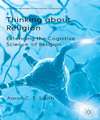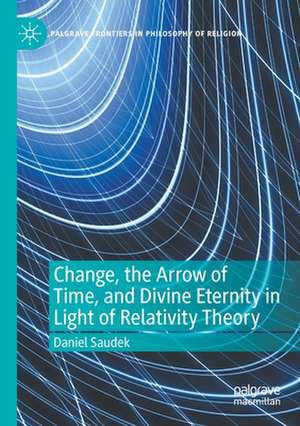Change, the Arrow of Time, and Divine Eternity in Light of Relativity Theory: Palgrave Frontiers in Philosophy of Religion
Autor Daniel Saudeken Limba Engleză Paperback – 20 mar 2021
In part two, this model is then applied to the perennial questions concerning the relationship between divine eternity and the temporal world: How can my future choices be free if God already knows what I will do? Can God act if He is not in time? Through the lens of relativity theory, such questions are shown to appear in a completely new light. The book combines insights from theoretical physics with ancient and contemporary philosophy into a unique synthesis, broaching a wealth of key issues including the arrow of time, the evolution of the cosmos, and a physics-based defence of eternalism in philosophical theology.
| Toate formatele și edițiile | Preț | Express |
|---|---|---|
| Paperback (1) | 522.56 lei 6-8 săpt. | |
| Springer International Publishing – 20 mar 2021 | 522.56 lei 6-8 săpt. | |
| Hardback (1) | 527.79 lei 6-8 săpt. | |
| Springer International Publishing – 20 mar 2020 | 527.79 lei 6-8 săpt. |
Din seria Palgrave Frontiers in Philosophy of Religion
- 20%
 Preț: 691.33 lei
Preț: 691.33 lei - 18%
 Preț: 727.18 lei
Preț: 727.18 lei -
 Preț: 391.61 lei
Preț: 391.61 lei - 18%
 Preț: 725.43 lei
Preț: 725.43 lei -
 Preț: 380.07 lei
Preț: 380.07 lei -
 Preț: 350.12 lei
Preț: 350.12 lei -
 Preț: 391.61 lei
Preț: 391.61 lei - 15%
 Preț: 641.53 lei
Preț: 641.53 lei - 18%
 Preț: 727.18 lei
Preț: 727.18 lei -
 Preț: 386.99 lei
Preț: 386.99 lei - 15%
 Preț: 634.82 lei
Preț: 634.82 lei -
 Preț: 263.45 lei
Preț: 263.45 lei -
 Preț: 357.63 lei
Preț: 357.63 lei -
 Preț: 386.81 lei
Preț: 386.81 lei - 18%
 Preț: 786.66 lei
Preț: 786.66 lei -
 Preț: 452.03 lei
Preț: 452.03 lei -
 Preț: 387.75 lei
Preț: 387.75 lei -
 Preț: 381.98 lei
Preț: 381.98 lei -
 Preț: 382.18 lei
Preț: 382.18 lei -
 Preț: 386.81 lei
Preț: 386.81 lei - 18%
 Preț: 789.20 lei
Preț: 789.20 lei - 15%
 Preț: 524.88 lei
Preț: 524.88 lei -
 Preț: 482.17 lei
Preț: 482.17 lei - 15%
 Preț: 529.92 lei
Preț: 529.92 lei - 18%
 Preț: 787.61 lei
Preț: 787.61 lei - 18%
 Preț: 722.12 lei
Preț: 722.12 lei -
 Preț: 387.96 lei
Preț: 387.96 lei -
 Preț: 393.52 lei
Preț: 393.52 lei - 18%
 Preț: 1122.42 lei
Preț: 1122.42 lei -
 Preț: 391.61 lei
Preț: 391.61 lei
Preț: 522.56 lei
Preț vechi: 614.79 lei
-15% Nou
Puncte Express: 784
Preț estimativ în valută:
99.100€ • 106.93$ • 83.37£
99.100€ • 106.93$ • 83.37£
Carte tipărită la comandă
Livrare economică 18 aprilie-02 mai
Preluare comenzi: 021 569.72.76
Specificații
ISBN-13: 9783030384135
ISBN-10: 3030384136
Pagini: 216
Ilustrații: XI, 216 p. 7 illus.
Dimensiuni: 148 x 210 mm
Greutate: 0.28 kg
Ediția:1st ed. 2020
Editura: Springer International Publishing
Colecția Palgrave Macmillan
Seria Palgrave Frontiers in Philosophy of Religion
Locul publicării:Cham, Switzerland
ISBN-10: 3030384136
Pagini: 216
Ilustrații: XI, 216 p. 7 illus.
Dimensiuni: 148 x 210 mm
Greutate: 0.28 kg
Ediția:1st ed. 2020
Editura: Springer International Publishing
Colecția Palgrave Macmillan
Seria Palgrave Frontiers in Philosophy of Religion
Locul publicării:Cham, Switzerland
Cuprins
1. Introduction.- Part I: Relativity theory and the passage of time.- 2. Models of time - a brief survey.- 3. The impact of the special theory of relativity on the philosophy of time.- 4. Cosmic time.- 5. World-wide becoming, block universe, or some tertium? Contemporary answers to the problem of time and relativity theory.- 6. Against substantival passage.- 7. Understanding how change relates to time.- 8. Duration of processes of change according to a causal theory.- 9. The arrow of time: the full derivation.- 10. Objections and comparisons.- 11. Our changing world.- Part II: God, change, and time.- 12. Does God change?.- 13. God's relations to temporal being.- 14.- The unlimited, the limited, and the world.
Notă biografică
Daniel Saudek lectures in philosophy at the universities of Konstanz and Sankt Georgen, Germany, and works as a consultant for the natural sciences for the Diocese of Limburg, Germany. He has published widely in the philosophy of science, in the field of science and theology, as well as in social and environmental ethics.
Textul de pe ultima copertă
This book has two aims; first, to provide a new account of time's arrow in light of relativity theory; second, to explain how God, being eternal, relates to our world, marked as it is by change and time.
In part one, Saudek argues that time is not the expansive universal 'wave' that is appears to be, but nor are we living in an unchanging block. Rather, time is real but local: there are infinitely many arrows of time in the universe, each with their own fixed past and open future. This model is based on the ontology of substances which can exist in different states, marked by different properties. On this basis, a derivation of temporal precedence and of the asymmetry between the fixed past and the open future is provided. Time's arrow is thus 'attached' to substances, and is therefore a local rather than global phenomenon, though by no means an illusory or merely subjective one.
In part two, this model is then applied to the perennial questions concerning the relationship between divine eternity and the temporal world: How can my future choices be free if God already knows what I will do? Can God act if He is not in time? Through the lens of relativity theory, such questions are shown to appear in a completely new light. The book combines insights from theoretical physics with ancient and contemporary philosophy into a unique synthesis, broaching a wealth of key issues including the arrow of time, the evolution of the cosmos, and a physics-based defence of eternalism in philosophical theology.
In part two, this model is then applied to the perennial questions concerning the relationship between divine eternity and the temporal world: How can my future choices be free if God already knows what I will do? Can God act if He is not in time? Through the lens of relativity theory, such questions are shown to appear in a completely new light. The book combines insights from theoretical physics with ancient and contemporary philosophy into a unique synthesis, broaching a wealth of key issues including the arrow of time, the evolution of the cosmos, and a physics-based defence of eternalism in philosophical theology.
Caracteristici
Provides a new account of time's arrow in light of relativity theory Explains how God, being eternal, relates to our world, marked as it is by change and time Combines insights from theoretical physics with ancient and contemporary philosophy in a unique synthesis
